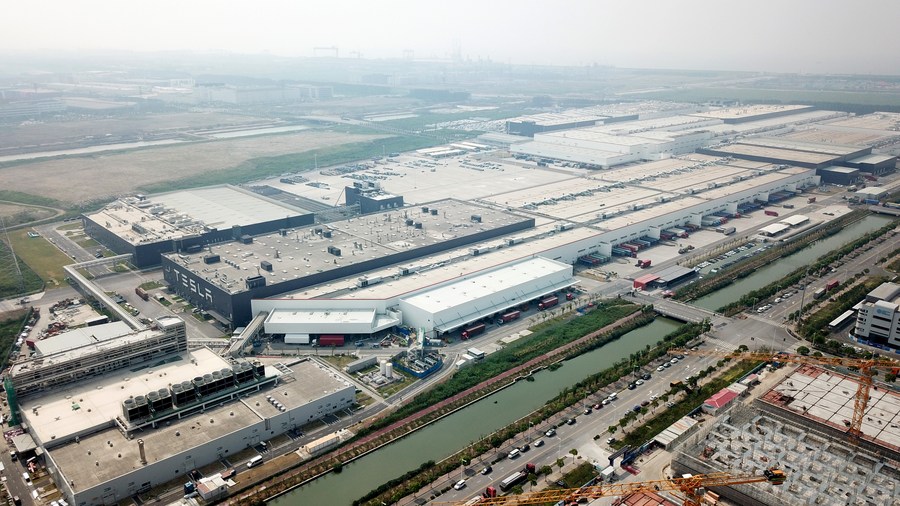
The Tesla Gigafactory in the Lin-gang Special Area of China (Shanghai) Pilot Free Trade Zone in east China's Shanghai, August 20, 2022. /Xinhua
The Tesla Gigafactory in the Lin-gang Special Area of China (Shanghai) Pilot Free Trade Zone in east China's Shanghai, August 20, 2022. /Xinhua
Editor's note: Daryl Guppy, a special commentator on current affairs for CGTN, is an international financial technical analysis expert. He has provided weekly Shanghai Index analyses for mainland Chinese media for more than a decade. Guppy appears regularly on CNBC Asia and is known as "The Chart Man." He is a former national board member of the Australia China Business Council. The article reflects the author's opinions and not necessarily those of CGTN.
Last week, U.S. President Joe Biden signed an executive order to restrict U.S. investment in China. A few days later, China's Ministry of Commerce announced upgrades to their investment policy – the Qualified Foreign Limited Partnership, which includes measures to encourage an increase in foreign investment in China.
Of the two initiatives, the opening of Chinese investment is the most welcome because it makes it easier to access the development of the world’s second-largest economy.
China's new guidelines included a more comprehensive facilitation mechanism for foreign exchange management. This reduces foreign exchange risk and encourages the de-dollarization of trade. Managing exchange risk is a major factor in investment and business decisions, so anything that reduces this risk is welcome.
China's Ministry of Commerce also promoted the shortening of China's negative list for foreign investment. The most sought-after areas of investment are those associated with the expansion of the digital economy and the clean green economy. China's digital economy appears to be more advanced than that of the West; so cooperation in these areas brings a competitive advantage.
Changes also included better research and development (R&D) facilitation. This will accelerate the development of high-end manufacturing using AI and Quantum computing solutions. The country's gross domestic expenditure on R&D increased to 3.09 trillion Chinese yuan ($424.32 billion) in 2022, surpassing the 3 trillion yuan ($411.96 billion) milestone for the first time, according to the National Bureau of Statistics and the Ministry of Science and Technology.
Chinese companies are stepping up R&D investment to develop products on their own without mimicking those acquired from Japanese, U.S. and European peers. Chinese auto manufacturer BYD has developed products such as the advanced-safety and high-capacity "lade battery" using lithium iron phosphate. Hygon Information Technology develops semiconductors for central processing units and artificial intelligence.

A model poses for photos with one of the latest vehicles from Chinese auto manufacturer BYD at the Tokyo Auto Salon in Chiba, Japan, January 13, 2023. /CFP
A model poses for photos with one of the latest vehicles from Chinese auto manufacturer BYD at the Tokyo Auto Salon in Chiba, Japan, January 13, 2023. /CFP
Access to cooperative research is both sought after by Western investors and is also one of their main concerns.
The primary investment concern is the potential use of U.S. executive orders and associated sanctions to prevent research and cooperation and to block investment. An executive order does not require the approval of Congress. The scope of the order, any changes, and the timing of implementation of the order are not dependent upon the fractured political process of congressional legislative approval.
Proponents of the restrictions note that the government has a year before the investment ban is enacted. They claim that the ban is going to target incremental investments in Chinese technology and that existing investments will be studied but not removed.
Accepting these claims requires a degree of caution as the United States moves into what will be a heated electoral year when political points are scored by being tough on China. Executive orders are notoriously adaptable to political circumstances.
Even if we put these concerns aside, Biden's restrictions are founded on the idea of blocking the development of dual-use technology for both civilian and military applications. This is technology that could have a military application in addition to any civilian use. This casts a wide net which can be used to inhibit or stop investment.
For instance, investment in BYD battery technology could be at risk if Biden's advisors decided this was a dual-use technology. Investment in BYD would be quickly blocked using an executive order.
The sectors currently under restrictions include AI, Quantum technology, and semiconductors. Not coincidently, these are the foundations of an advanced and productive digital economy; so blocking investment in these areas also has the effect of slowing China's progress towards a prosperous society. Biden denies this is the intent, but this impact remains a known and unavoidable collateral damage inflicted by these restrictions.
Currently, the proposed orders do not restrict investments into Chinese electric vehicles, fintech, and biotech; but there is no guarantee this will not change, particularly moving into a U.S. election year.
This political uncertainty inherent in executive orders adds a new and unwelcome level of risk to investment in, and business with, China. Undoubtedly, pressure will be applied to Europe and Japan to follow any U.S. restrictions.
Investing in China has become easier, but Biden's executive order announcement is seeking to make it more difficult. On balance, China's initiatives to further encourage foreign investment are an excellent development both for China's industry and for progress towards a greener and more digitally advanced global economy.
(If you want to contribute and have specific expertise, please contact us at opinions@cgtn.com. Follow @thouse_opinions on Twitter to discover the latest commentaries in the CGTN Opinion Section.)